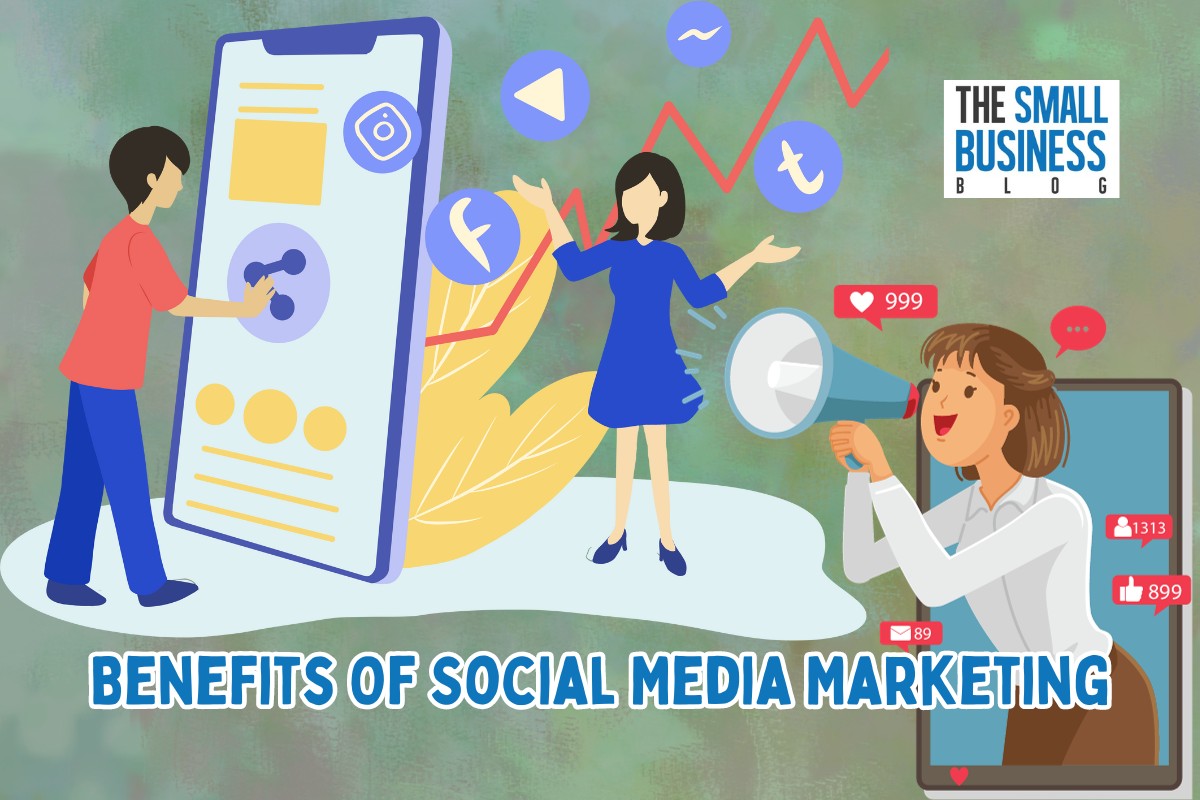In a world where everything is slowly becoming more and more digital, standard business strategies aren’t enough to get ahead.
Businesses need to know about the different benefits of social media marketing if they want to stay in business and grow it today.
Having an online presence isn’t enough; you need to use platforms strategically to bring your business to the forefront.
In this article, we look into the advantages of advertising on social media that go beyond the obvious, showing why social media marketing is such an essential part of modern business.
Post Contents
- 1 Benefits of Social Media Marketing
- 1.1 1. Enhanced Brand Visibility
- 1.2 2. Increased Website Traffic
- 1.3 3. Targeted Advertising
- 1.4 4. Improved Customer Engagement
- 1.5 5. Cost-Effective Marketing
- 1.6 6. Real-time Analytics and Insights
- 1.7 7. Global Reach and Expansion
- 1.8 8. Building Brand Authority
- 1.9 9. Humanizing Your Brand
- 1.10 10. Study the Competition
- 2 How Social Media Marketing Actually Works
- 3 Frequently Asked Questions
- 4 Conclusion
Benefits of Social Media Marketing
Let’s go over the ten main benefits you get from marketing on social media.
1. Enhanced Brand Visibility
Social media is a dynamic stage for businesses to showcase their brand personality.
Through strategic presence on platforms like Facebook, Twitter, and Instagram, companies can create an immersive brand experience.
It’s not just about being seen; it’s about leaving a lasting impression.
Engaging content, visually appealing graphics, and consistent messaging contribute to fostering brand recognition.
In a world of fleeting attention, social media marketing acts as a spotlight, illuminating your brand for a diverse and expansive audience.
2. Increased Website Traffic

Imagine social media as the bustling avenue leading people straight to your storefront – in this case, your website.
The benefits of social media marketing extend beyond mere visibility; it’s a powerful driver of website traffic.
By crafting content that captivates, intrigues, and resonates with your audience, businesses can compel users to take the next step – clicking through to your website.
It’s not just about numbers; it’s about quality traffic with the potential for meaningful conversions and increased sales.
Social media becomes the gateway, beckoning users to your online presence’s heart.
3. Targeted Advertising
Gone are the days of casting a wide net and hoping for the best.
Social media marketing empowers businesses with the precision of a laser-focused targeting system.
Platforms like LinkedIn and Facebook offer sophisticated tools to tailor advertisements to specific demographics.
This strategic approach ensures that your content reaches the eyes that matter most – your potential customers.
By understanding your audience’s preferences, behaviors, and interests, social media becomes a canvas for personalized advertising, maximizing impact and return on investment.
4. Improved Customer Engagement
Beyond transactional interactions, social media platforms provide a space for genuine connections.
It’s not just about broadcasting messages; it’s about engaging in meaningful conversations.
Comments, direct messages, and polls allow businesses to interact directly with their audience.
This direct line of communication humanizes the brand and serves as a treasure trove of insights.
Through genuine engagement, businesses gain valuable feedback, understand customer sentiments, and, most importantly, build a community of loyal advocates.
5. Cost-Effective Marketing
Efficiency often comes at a high cost when it comes to advertising.
However, social media marketing emerges as a game-changer, providing businesses with a cost-effective solution that doesn’t compromise impact.
Unlike traditional advertising channels with hefty price tags, social media allows companies to reach their target audience without breaking the bank.
Businesses can achieve significant results on a budget through the strategic use of targeted ads and leveraging organic reach.
This democratization of advertising levels the playing field, allowing both small startups and established enterprises to compete on the same stage, ensuring that every dollar spent delivers tangible and meaningful results.
6. Real-time Analytics and Insights

Social media platforms equip businesses with robust analytics tools that provide real-time insights into the performance of their content.
This data-driven approach is a game-changer, allowing businesses to adapt and refine their strategies.
From understanding audience engagement to tracking the effectiveness of campaigns, the ability to access real-time analytics empowers businesses to make informed decisions.
7. Global Reach and Expansion
The geographical constraints that once limited business expansion are dismantled by the global reach facilitated by social media.
Breaking through borders, businesses can now connect with audiences worldwide.
This international exposure is not just about reaching more people; it’s about opening doors to new markets and unprecedented opportunities for growth.
Social media transforms businesses into global entities, providing a platform to showcase products, services, and ideas to a diverse audience.
The ability to transcend geographical boundaries is a cornerstone of the benefits of social media marketing, offering a passport to new horizons and untapped potential.
8. Building Brand Authority

Trust is the currency of the digital age, and social media is the trust-building workshop for businesses.
By consistently delivering valuable content, companies can position themselves as authorities in their respective industries.
The content shared on social media platforms isn’t just promotional; it showcases expertise, insights, and thought leadership.
This commitment to delivering value establishes credibility and influence, significantly impacting consumer decisions.
In a landscape inundated with choices, brand authority becomes the guiding light that steers consumers toward options they can trust.
9. Humanizing Your Brand
The human touch is a powerful differentiator in a world dominated by digital interactions.
Social media provides a canvas for businesses to showcase the human side of their brand.
Behind-the-scenes content, employee spotlights, and customer testimonials contribute to humanizing the brand and fostering authentic connections.
It’s not just about products or services; it’s about the people behind the brand and the stories that resonate with the audience.
10. Study the Competition
By carefully observing competitors’ social media profiles, businesses can gain valuable insights into their strategies, content approaches, and audience engagement tactics.
This competitive intelligence goes beyond traditional market research, offering real-time data on what works and what doesn’t in the digital sphere.
Social media platforms become an open book, revealing the strengths and weaknesses of competitors.
Analyzing their content, monitoring audience reactions, and identifying gaps in their strategies can inform and refine your approach.
By understanding the competition’s successes and learning from their missteps, businesses can fine-tune their own social media strategies for maximum impact and sustained growth.
How Social Media Marketing Actually Works
Understanding the mechanics behind social media marketing is crucial for harnessing its benefits effectively.
It’s not just about posting content and hoping for the best; it’s a strategic dance in the digital realm.
Let’s delve into the intricacies of how social media marketing works.
1. Target Audience Identification:
Social media marketing kicks off with a deep dive into understanding your target audience.
It’s about connecting with the right people.
Businesses use data analytics tools to identify demographics, behaviors, and preferences, ensuring their content resonates with those most likely to convert.
2. Content Strategy and Creation

Crafting compelling content is the heart of social media marketing.
Businesses develop a content strategy that aligns with their brand voice and resonates with their audience.
This could include a mix of engaging visuals, thought-provoking captions, and shareable content to maximize reach.
3. Platform Selection and Optimization
Each social media platform has its unique audience and dynamics.
Understanding the nuances of platforms like Facebook, Instagram, Twitter, and LinkedIn is crucial.
Businesses strategically select platforms based on their target audience and optimize their profiles to reflect their brand identity consistently.
4. Paid Advertising and Targeting

While organic reach is powerful, paid advertising amplifies the impact.
Social media platforms offer targeted advertising options, allowing businesses to tailor their content to specific demographics.
This precision ensures that ad budgets are utilized efficiently, reaching those most likely to engage with the content.
5. Engagement and Interaction
Social media is a two-way street.
Businesses engage with their audience through comments, direct messages, and polls.
This interaction goes beyond promotion; it’s about building a community.
Responding promptly, fostering conversations, and showing appreciation for audience participation contribute to a thriving online presence.
Frequently Asked Questions
Is social media marketing only suitable for large businesses?
No, social media marketing is beneficial for businesses of all sizes.
It provides cost-effective solutions and levels the playing field for small and large enterprises.
Can social media marketing replace traditional advertising?
While it complements traditional advertising, social media marketing offers a more cost-effective and targeted approach, making it a valuable addition to any marketing strategy.
How can businesses measure the success of their social media marketing efforts?
Real-time analytics tools on social media platforms help businesses track the performance of their content, providing insights into reach, engagement, and conversions.
Is it essential for businesses to be on multiple social media platforms?
The choice of platforms depends on the target audience.
However, being present on multiple platforms can maximize reach and diversify the audience.
Conclusion
As we look into the benefits of social media marketing, we see a world full of chances.
Beyond the usual ideas of brand awareness and cost-effectiveness, social media marketing is a dynamic force that creates authentic connections, improves targeting accuracy, and quickly adjusts to the changing digital landscape.
As businesses become more competitive, using the numerous advantages of social media marketing stops being a choice and becomes a strategic necessity.
This helps brands become more resilient and relevant and grow over time.






























